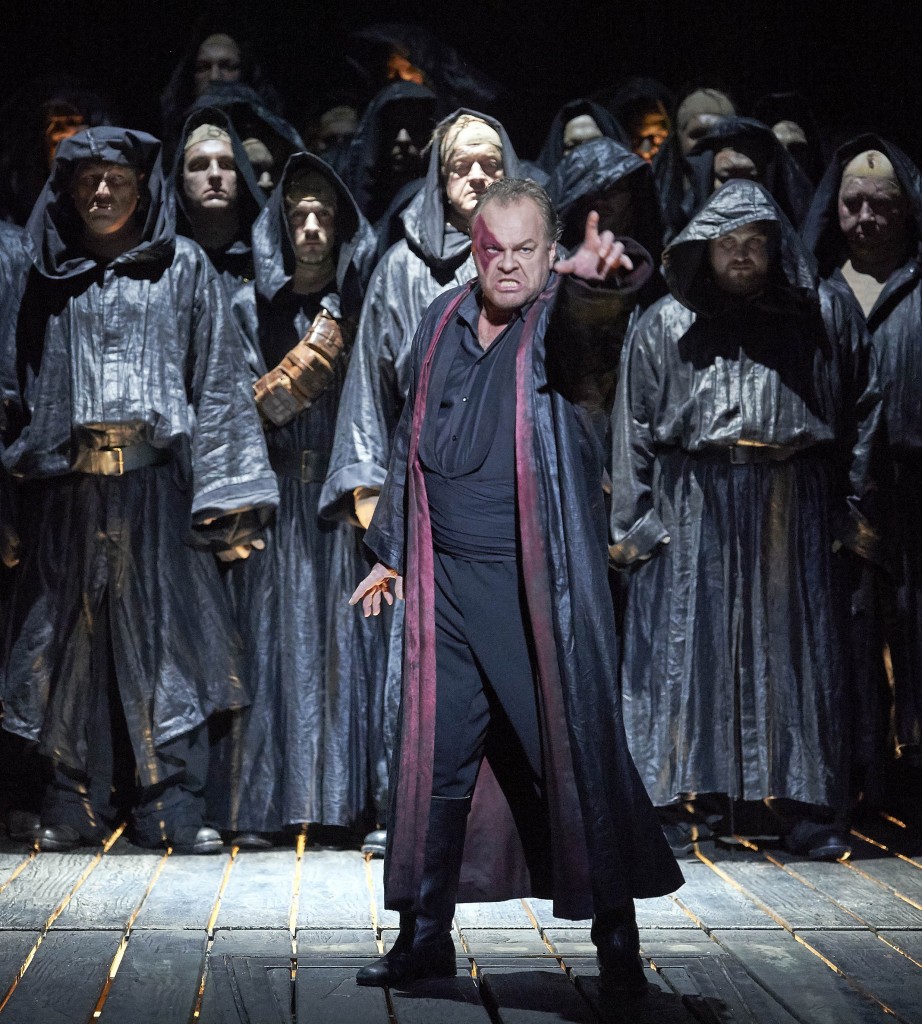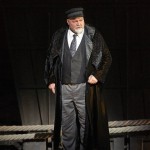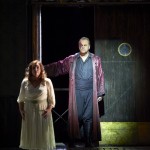 Vienna State Opera’s curtain -a veil depicting a biblical figure fighting the waves- rises on the Daland’s crew , pulling on heavy ropes, and singing lustily. In Christine Mielitz’s production , the stage (Stefan Mayer), is framed by a solid-wooden, archaic structure resembling a Viking longboat; side-stage, black panels with spotlight portals. Daland (Hans-Peter König), an imposing figure whose rich bass stamps his authority on this production , sings of how they’re blown off course -near to home and his daughter. The helmsman (Thomas Ebenstein’s light tenor), who’s keeping watch, sings (Mein Madel), the wind brings him nearer to his woman; and drops off to sleep.
Vienna State Opera’s curtain -a veil depicting a biblical figure fighting the waves- rises on the Daland’s crew , pulling on heavy ropes, and singing lustily. In Christine Mielitz’s production , the stage (Stefan Mayer), is framed by a solid-wooden, archaic structure resembling a Viking longboat; side-stage, black panels with spotlight portals. Daland (Hans-Peter König), an imposing figure whose rich bass stamps his authority on this production , sings of how they’re blown off course -near to home and his daughter. The helmsman (Thomas Ebenstein’s light tenor), who’s keeping watch, sings (Mein Madel), the wind brings him nearer to his woman; and drops off to sleep.
From behind the cavernous stage, out of the dark figures shrouded in black, emerges the Dutchman (Michael Volle) to sing his monologue, Die Frist ist um, brooding , an introspective ‘aria’ anticipating Wagner’s later operas. Volle, wearing a dark cloak, stocky, greying (older than expected), is impressive, his baritone sensual, but not supernatural: lacking the immensely deep vocal reserves of Finn Juha Uusitalo, or Alfred Dohmen, recently in the role, gaunt, haunted figures both.
Volle’s Dutchman sings of how often he plunged the depths, drove his ship into rocky graveyards: but nowhere could he find a grave. Such is the fate of damnation. Who renewed the terms of his salvation, tell me Angel of God. Was I the object of your mockery? There’s no such thing as eternal love on earth. But he has one last hope: that the earth might perish. The Day of Judgement: Doomsday. When all the dead are resurrected- he’ll dissolve into nothing. Ewige Vernichtung. Tremendous!
Wagner’s ‘aria’, breaking the shibboleths of 19th Century bourgeois good taste: revolutionary, bursting musical frontiers, and anticipating The Ring and Tristan und Isolde. But, no room for applause: straight into the ghostly chorus, ‘May eternal oblivion save us.’

In the encounter between Daland and the Dutchman, at first brusque, the Dutchman asks for shelter. He comes from far away: would they refuse him shelter. ‘The ship has suffered no harm.’ The grim hulk of the Holländer inches slowly, jutting across the stage. He cannot tell how long : he no longer counts years. He’s lost his family, and unable to reach his Heimat (homeland). The ship’s laden with treasures- to pay for his board, the price of one night’s shelter. He’s heard about Daland’s daughter Senta: ‘then let me marry her.’ Daland, greed focused under a red light, sings of the Dutchman’s generosity: he’ll make a good son-in-law. On the bridge of the Holländer, against the black-hooded crew, Volle has a red scar over his left eye , as if attacked by some malevolent creature, or bird of prey.
In the second Act, preceding Senta’s appearance, we see women knitting- part of Wagner’s view of women, (the 19th century) way of keeping women occupied. They sing, ‘Good spinning wheel , my love is out there sailing the oceans.’ In the quaintly charming choreography, some of them get entangled in their skeins of wool. Light relief.
Senta (Ricarda Merbeth), ‘always looking at that picture’, sings her ballad about the Flying Dutchman: how he was cursed by the devil to sail the high seas forever; and who can only be redeemed by the pledge of woman’s love until death. In the middle of the refrain , ‘Where is she , who will remain true’, she jumps up, and exultantly proclaims, ‘Through me you shall achieve salvation!’ (Durch mich sollst du heil.)
At which moment, Erik, the huntsman in love with her, enters. Herbert Lippert appears in a tan leather jacket and modern pants- while, in a costume mix-up, the chorus of women are wearing Victorian ankle-length gowns. Merberth, a stout lady in a white gown, is rather maternal looking. In their duet, Erik, afraid of losing Senta, tries to stop her obsession with the Flying Dutchman, who’s trapped her like a Satan. (Her vision of him speaks to her as if from time past.) Erik is described as hot-headed, but Lippert, a lyrical tenor, beautifully sung, seems rather harmless- a bit of a dolt? But now it’s all clear to her: she must perish with him, her Dutchman.
Daland arrives with the Dutchman , introducing ‘this stranger’. A seaman like him, he bids her welcome him. Banished from his homeland – Daland touts for him – he’ll pay for his hearth. Hans-Peter König’s venal Daland is very good, a powerful presence in his dark cloak, fur collar (a sign of affluence), and seaman’s cap.
Volle’s Dutchman at first sings to her from the vault of the stage. Satan’s malice left him only a throbbing heart (unrequited love.) Now his desire is deliverance! Michael Volle’s baritone has a nobility, a rich timbre ; but he lacks the power of Wagner’s super -Helden : beautifully sung, but misses the supernatural dimension. 
In their duet, Merbeth sings of the power buried in her breasts- what should she call it? Would that he could gain deliverance. Now, vocally, she rises to Wagnerian heights. She stands behind him , hands outstretched, then her fingers hold him tenderly. ‘Oh, what suffering! If only she could bring him comfort.’ (She’s an angel to comfort him, a damned soul.) The duet, much better from Merbeth, but Volle is grounded a mere mortal , passionate , but not immortal.
Act 3, the wedding preparations, opens with Daland’s sailors , and the opera’s big tune celebrating their homecoming. Steuermann…We fear nothing. We laugh at wind and storm. Fabulous singing. The Daland crew , in their modern black suits and crisp white shirts, are knocking back crates of German beer, like stock market traders on a good Friday night. They invite the Dutchman’s crew to join them, but get no response. The Dutchman’s crew are indeed dead: they don’t need food and drink. (You’ve heard about the Flying Dutchman? They’re all ghosts.)
The men throw off their jackets, ready for the girls. And strip off to their vests, first loosening, then tearing off, their shirts. There’s a whole orgy going on front of stage. They, some respectable wives, have to pull off one sailor (coitus interrupted.) Very well staged .
Then, bathed in a red light , as if to suggest a storm, the sea becomes violent, and the Dutchman’s ghostly crew sing an ominous chant. The stage seems to be strewn with black corpses- yes, corpses on a plague-ridden ship.
Erik tries to stop Senta’s seeing the Dutchman. But she stands defiant: she won’t listen to him any more. But Senta, you promised to be faithful, Lippert sings with lyrical passion. Behind them approaches the gaunt figure of the Dutchman, who (hearing this) is convinced Senta has betrayed him. ‘Verloren, heil!- Meine treue ist getan. Einige Verdamn ist ihr los!’ She should have been rescued. Now she is lost. (He releases her from her promise, and flees to his ship.)
But Senta still insists she is the one to end his suffering. ‘Faithful until death ,’ she plunges into a sea of flames – very realistic, frightfully realistic, a fire on stage demarcating a grave, uncomfortably close. The ship appears to sink.
With each performance, I get nearer to understanding this complex, enigmatic opera- apparently a simple seafaring tale, but its myths , the ‘Flying Dutchman legend, the homeless, endlessly wandering figure, mine the ground-rock of human mythology.
Christine Mielitz’s staging, bridging the classic with the modern- the Norwegian longboat symbolically foreground- is a workable compromise. (At least, this time, I was closer to the stage.) The cast here was not ideal, the leads , Volle and Merberth, in their roles, very acceptable. Chorus was excellent. Vienna State Opera Orchestra, was conducted by the inspirational Peter Schneider, who was not quite on form. © P.R. 8.09.2013
Photos: Michael Volle (Der Holländer); Hans-Peter König (Daland); Ricarda Merberth (Senta) and Hans-Peter König (Daland)
© Wiener Staatsoper /Michael Pöhn
viennaoperareview.com
Vienna's English opera blog
